SCOTUS

On March 29, public sector unions narrowly avoided a severe blow as the Supreme Court handed down a 4-4 ruling in the case of Friedrichs v. California Teachers’ Association. The split ruling in the case, which dealt with the use of “fair-share” fees by public unions to fund their collective bargaining on behalf of all employees (including non-union employees).
The split ruling means that the Ninth Circuit’s ruling in favor of the teachers’ union and their use of such fees will stand, though no new precedent will be set.

Amid the helium balloons, dance music, chants, and counterchants, Katie Stone and Katie Breslin spelled out their opposing views outside the Supreme Court as the justices inside heard one of the most contentious cases of the year. The two 20-something Christians, both motivated by faith, say the justices’ ruling in Zubik v. Burwell could affirm or weaken the most basic of rights. The case asks whether religious nonprofits must comply with the Affordable Care Act’s contraception mandate, or whether it violates the federal law that sets a high bar for government infringement on religious rights.

One of the most anticipated cases of this Supreme Court season revolves around nuns and birth control.
Zubik v. Burwell, which comes before the justices Wednesday, addresses one of the most contentious parts of the Affordable Care Act: the requirement that employers offer certain types of birth control to their employees — the so-called contraceptive mandate.
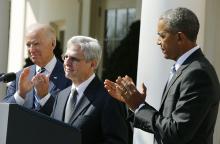
President Obama’s nominee for the Supreme Court, Merrick Garland, would be the current court’s fourth Jewish justice if confirmed.
For Jews, who represent about two percent of the population, holding 44 percent of the seats on the court might be a point of pride.
But is it anything more than that?
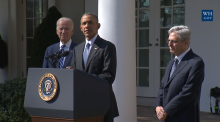
When Antonin Scalia died in mid-February, one question was on everyone's mind: Who's next?
Obama has selected Merrick Garland, 63, confirming leaked reports in anticipation of Obama's 11 a.m. news conference. Here are five things to know about the SCOTUS nominee.

For Immediate Release:
March 8, 2016
Contact
Megan Cagle, (602) 399-0723
Paul Marchione, (202) 601-7869
***Press Release***
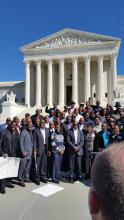
Black clergy from across the country are expressing moral outrage about the Republican-led Senate’s vow to block any nominee President Obama picks to fill a vacancy on the Supreme Court, saying it reflects racism and disrespect. The Rev. Freddy Haynes of Dallas said on March 4 that Senate Republicans have condemned statements about racism by the leading GOP presidential candidate Donald Trump but he said they need to act on those words.
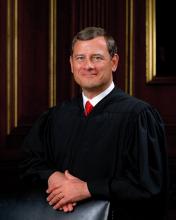
Supreme Court Chief Justice John Roberts has rejected a plea to block an EPA air pollution rule. Despite the fact that the Supreme Court ruled 5-4 last year that the mercury and air toxics standards rule is illegal, Roberts unilaterally rejected twenty conservative states' request to block it, in a big win for the Obama administration.
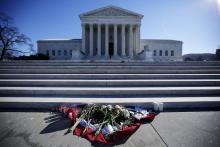
Some Christians are starting to clamor for President Obama to refrain from appointing a replacement for Supreme Court Justice Antonin Scalia. Evangelical Ted Cruz has gone so far as to suggest that the next Supreme Court justice should be nominated by the next president (who he hopes will be (a) himself, or (b) at least a Republican). The senator has also extolled Justice Scalia as a champion of religious freedom and a model for the type of justice the Senate should confirm. That’s what scares me. They have it backwards, President Obama should act now and nominate someone with a deeper appreciation of religious freedom than Scalia showed in important cases.
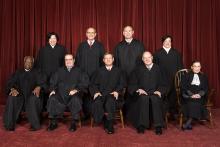
The death of Supreme Court Justice Antonin Scalia is a major setback for the conservative legal movement, as will become clear in the months ahead.
This was to be the term conservatives roared back after one in which the court’s liberal bloc won most of the important cases, such as same-sex marriage and Obamacare. On tap to be decided in the next four months are cases affecting abortion rights, affirmative action, voting rights, the power of labor unions and President Obama’s health care and immigration policies — and conservatives stood at least a chance of winning them all.
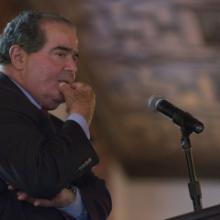
Scalia told a gathering at a Catholic high school near New Orleans on Jan. 2, “one of the reasons God has been good to us is that we have done him honor.”
“Unlike the other countries of the world that do not even invoke his name, we do him honor. In presidential addresses, in Thanksgiving proclamations and in many other ways,” he said in a brief talk at Archbishop Rummel High School in Metarie, according to various news reports.

Today is the 50th anniversary of the landmark Voting Rights Act, passed Aug, 6, 1965. The act, signed into law by President Lyndon B. Johnson, created key provisions to prevent racial discrimination in voting laws.
The Voting Rights Act has been called "the single most effective piece of civil rights legislation ever passed by Congress."
Today's anniversary is a bittersweet commemoration. In 2013, the Supreme Court struck down Section 4, which had required Alabama, Alaska, Arizona, Georgia, Louisiana, Mississippi, South Carolina, Texas, and Virginia to seek federal approval before imposing changes to voter laws.
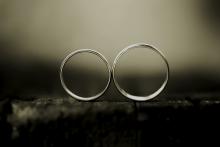
A few weeks ago, the single person’s lament was eloquently stated in The New York Times opinion pages, with a piece called "The Supreme Court’s Lonely Hearts’ Club" by Michael Cobb. Cobb articulated some of the pause that many of us singles have felt as the conversation has gone on about marriage, in particular how Justice Kennedy captured the spirit of the age by extolling the matrimony as the highest institution in the land.
I don’t disagree about the importance of marriage, but I have a lot of concern about how it has been talked about and in many ways idolized in this country. Much of the church has led the way on this idolatry — on the policy end, claiming the need to defend marriage; on the spiritual side, treating marriage as a pseudo-salvation, as though being married means that in some way you’ve "arrived" spiritually.
A few weeks ago, the single person’s lament was eloquently stated in The New York Times opinion pages, with a piece called "The Supreme Court’s Lonely Hearts’ Club" by Michael Cobb. Cobb articulated some of the pause that many of us singles have felt as the conversation has gone on about marriage, in particular how Justice Kennedy captured the spirit of the age by extolling the matrimony as the highest institution in the land.
I don’t disagree about the importance of marriage, but I have a lot of concern about how it has been talked about and in many ways idolized in this country. Much of the church has led the way on this idolatry — on the policy end, claiming the need to defend marriage; on the spiritual side, treating marriage as a pseudo-salvation, as though being married means that in some way you’ve "arrived" spiritually.
A few weeks ago, the single person’s lament was eloquently stated in The New York Times opinion pages, with a piece called "The Supreme Court’s Lonely Hearts’ Club" by Michael Cobb. Cobb articulated some of the pause that many of us singles have felt as the conversation has gone on about marriage, in particular how Justice Kennedy captured the spirit of the age by extolling the matrimony as the highest institution in the land.
I don’t disagree about the importance of marriage, but I have a lot of concern about how it has been talked about and in many ways idolized in this country. Much of the church has led the way on this idolatry — on the policy end, claiming the need to defend marriage; on the spiritual side, treating marriage as a pseudo-salvation, as though being married means that in some way you’ve "arrived" spiritually.
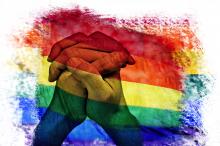
The year is 2005. We are sitting down to dinner with our friend, Michael, in his apartment. Michael is gay and he’s wrestling with what that means. He is also searching for a church and he is drawn to oursbecause his theology and his understanding of God appear to align well with it. At some point in the meal he stops the conversation and asks bluntly,
"Do you think I would be welcome at your church? Is there is a place for someone like me?"
Jason and I exchange a look and the table falls silent. Finally I look up at Michael and say quietly,
“No. No, I don’t think there is. I’m so sorry.”
Fast forward several years. We’re in a new city and a new church. Jason gets an email from someone interested in checking out said church the following Sunday. She explains that she is gay and believes God made her that way. She’s not interested in debating the point. She’s just interested in finding a church. She thinks ours might be a good fit and asks the exact same question that Michael asked:
"Do you think I would be welcome at your church? Is there is a place for someone like me?"
Jason agonized over that email for days and it pained him immensely to write her back and say no. No, I don’t think there is. I’m so sorry.

“I believe Jesus would. I don’t have any verse in scripture. … I believe Jesus would approve gay marriage, but that’s just my own personal belief. I think Jesus would encourage any love affair if it was honest and sincere and was not damaging to anyone else, and I don’t see that gay marriage damages anyone else…” —Jimmy Carter, from his interview with Huffington Post Live
I grew up in Texas as a churchgoing Baptist. I memorized Bible verses as part of my “sword drills,” went to church camp, took part in the clown ministry and even helped in the nursery.
Then I was kicked out at age seventeen for asking too many questions. My youth minister actually threw a Bible at my head and, in a less than nuanced way, invited me to move on, lest I contaminate the minds and hearts of my friends with my doubt.
Some of my questions had to do with their biblical interpretation, which was literal — and their assertion that the texts we were memorizing were the perfect, infallible Word of God, straight from the mind of the Divine to the paper on which it was written.
I had questions.

When I think about that trip to Charleston with its confederate flag, slave auction block, statues to slave holders, and museums honoring the daughters of the confederacy, it makes it a whole lot harder to fully believe in the hashtag #lovewins. And when I see the subtle and not-so-subtle ways that racism has infused a largely white-led movement for LGBTQ justice — an infusion I have been complicit in even as I have attempted to critique it — my conscience convicts me. I know that in this one moment, love has won a precious victory that allows me the privilege to be healthy, loved, and fully seen. I also know that at this moment systemic racism has murdered nine beautiful people and brutalized countless others. It is a moment in time that asks us to both celebrate and mourn, and more than anything else reminds us of the work yet to be done.

“The court now holds that same-sex couples may exercise the fundamental right to marry. No longer may this liberty be denied to them.”
With these words, Justice Anthony Kennedy supported the decision of the Supreme Court to legalize same-sex marriage in the United States. Gay and lesbian couples across the country are celebrating this long-awaited decision. Those who are Christians are not only thanking the court but also thanking God. But we know that other Christians are not giving thanks — some are angry, others are confused and uncertain. Can a faithful Christian support the court’s decision? What can we say in response to questions voiced by some Christians?
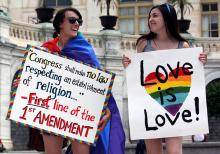
I would like to believe that Charlotte and Trudy are in the world to come, applauding and dancing.
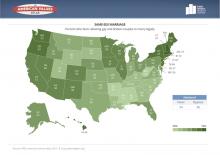
The Supreme Court ruling June 26 to legalize gay marriage rested in pragmatic legal reasoning, the same approach in the June 25 ruling on the Affordable Care Act — the decision that saved Obamacare from a “death spiral.”
Justice Anthony Kennedy, author of the majority opinion in the 5-4 decision, described equal protection under the law as an inevitable step in the evolution of changing understandings of marriage across the centuries and essential for the safety and dignity of thousands of gay and lesbian couples and their children.
The Supreme Court ruling June 26 to legalize gay marriage rested in pragmatic legal reasoning, the same approach in the June 25 ruling on the Affordable Care Act — the decision that saved Obamacare from a “ death spiral.”
Justice Anthony Kennedy, author of the majority opinion in the 5-4 decision, described equal protection under the law as an inevitable step in the evolution of changing understandings of marriage across the centuries and essential for the safety and dignity of thousands of gay and lesbian couples and their children.

In the days before the Supreme Court made it possible for gay couples to marry everywhere in the U.S., we asked two couples of faith — one Jewish who live in a state that forbids gay marriage, and one Christian and opposed to gay marriage — what the decision would mean to them.